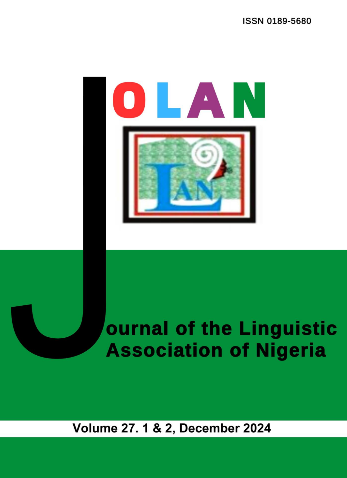A contrastive study of reduplication in the Igbo and Hausa languages
Keywords:
Language teaching, contrastive analysis, language education, reduplication, second language learningAbstract
The Igbo and Hausa languages belong to different language families, and are agglutinative and inflecting languages respectively. As languages of two of the majority ethnic groups in Nigeria, their speakers may have interest in learning each other’s language. However, possible differences in structures of the two languages may hamper their easy learning and teaching. This paper presents a contrastive study of reduplication in Igbo and Hausa aimed at identifying their differences and similarities and aiding in learning and teaching them. The primary data obtained through oral interview of speakers of the two languages and the secondary data from literature are analysed using the descriptive analysis and contrastive analysis methods. The results reveal some similarities and differences in the reduplication processes of both languages. Both languages operate complete and partial reduplication, and their complete reduplication involves doubling the entire word. The reduplication process in Hausa is more complex than in Igbo, especially the partial reduplication, which most often results into geminate consonant that is disallowed in Igbo. Complete reduplication in Hausa does not involve inter-fix of a morpheme to the reduplicated form as sometimes witnessed in Igbo. The learners and their teachers should obtain copies of contrastive study done on grammar of these languages, including this one, and the teachers carefully should drill the students on those areas they foresee difficulties in learning the languages.
References
Adamu, M. (1978). The Hausa factor in West African history. Ahmadu Bello University Press.
Anagbogu, P. N. (1990). The grammar of Igbo nominalizations. University Publishing Company.
Arokoyọ, B. E. (2006). A comparative study of reduplication in Hausa and standard Yoruba. Alore – Ilorin Journal of the Humanities, 16, 133-151.
Ativie, C. A. (2011). Aspects of the syntactic problems of Esan learners of English. Journal of Linguistic Association of Nigeria, 14(2), 249–62.
Bauer, L. (2003). Introducing linguistics morphology. Edinburgh University.
Booij, G. (2005). The grammar of words. Oxford University Press.
Caron, B. (2015). Hausa grammatical. Hausa Grammatical Sketch. https://shs.hal.science/halshs- 00647533/file/CARON_Hausa_SKETCH_2013- 10- 02.pdf
Corder, P. S. (1973). Introducing applied linguistics.
Hazel Watson. Eme, C. A., & Uwaezuoke, H. A. (2015). Teaching the standard Igbo to Umuolum students: Issues in phoneme variation among the dialects. NKỌA (Nkụzi na Ọmụmụ Asụsụ), 3, 19–38.
Ezikeojiaku, P. A. (1978). An aspects of Igbo morphology: The interfix. [Annual Seminar of the Society for Promoting Igbo Language and Culture on February 17, 1978]. University of Nigeria.
Green, M. M., & Igwe, G. E. (1963). A descriptive Igbo grammar. Academic-Verlag.
Humbolbt-Universität zu Birlin. (2015). The Hausa language. https://www.iaaw.hu-berlin.de/en/africa/linguistik undsprachen/african_languiages/hausa
Inkelas, S., & Zoll, C. (2005). Reduplication. Cambridge University Press.
Lado, R. (1957). Linguistic across cultures: Applied linguistics for language teaching. University of Michigan Press.
Mathews. P. H. (1993). Morphology. Cambridge University Press,
O’Grady, O. W., & Guzman, V. P. (1996). Morphology: The analysis of word structure. In O. W. O’Grady, M. Dobrovolsky, & F. Katamba (Eds.). Contemporary Linguistics. An Introduction. pp. 132-173. Addison Longman.
Ojukwu, C. K. (2018). A contrastive study of Igbo and English derivational affixes. Nsukka Journal of the Humanities, 26(1), 40-52.
Okorji, R. I., & Okeke, C. O. (2009). The effects of the differences between the sound systems of English and Igbo on the effective learning of English in Nigerian schools. Nkuzi Na Ọmụmụ Asụsụ (NKOA), 2, 25-36.
Osuagwu, B. I. N., Nwaozuzu, G. T., Dike, G. A., Nwaogu, V. N., & Okoro, L. C. (1997). Fundamentals of linguistics. Colon Concepts.
Oyebade, F. (1992). Phonology II. In Yusuf, O. (ed.). Introduction to linguistics. University of Ilorin Press.
Pei, M. A. (1966). Glossary of linguistic terminology. Garden City.
Sasu, D. D. (2022). Languages in Nigeria 2021, by number of speakers. Statista. https://www.statista.com/statistics/1285383/population-in- nigeria-by-languagesspoken/
Smith, M. S. (1979). Strategies, language transfer and simulation in second language learner’s mental operations. Language Learning, 29(2), 345 – 61.
Ubi, N. (2015). A contrastive analysis of tense and aspect in English and Lokaa languages. MA Thesis, University of Ilorin.
Uwaezuoke, A. H. (2019). Strengthening and weakening of tone in Igbo: A descriptive analysis. Journal of Linguistics, Language and Culture, 6(2), 1–13.
Uwaezuoke, A. H., & Onwudiwe, G. E. (2022). A phonological description of tone metathesis in Igbo. Journal of West African Languages, 49(1), 67–75.
Uwaezuoke, H. A., & Ogunkeye, O. M. (2017). A Contrastive morphological analysis of tenses formation in Igbo and Yoruba: Implication on learners and teachers. UNIZIK Journal of Arts and Humanities, 18(3), 193-219.
Weinreich, U. (1953). Languages in contact: Findings and problems. Linguistic Circles. Wolff, H. E. (n. d.). Hausa language. Encyclopaedia Britannica. Accessed 8 August 2023. https://www.britannica.com/topic/Hausa-language.
Ziegelmeyer, G. (2022). Attenuation by reduplication in Hausa and beyond. Journal of African Languages and Literatures, 3, 106-119.
Zubairu, H., & Ahmed, A. W. (2012). Nominal reduplication in Hausa and Yoruba languages. Ramat Journal of Management, Science and Technology, 1(2), 1-9.














